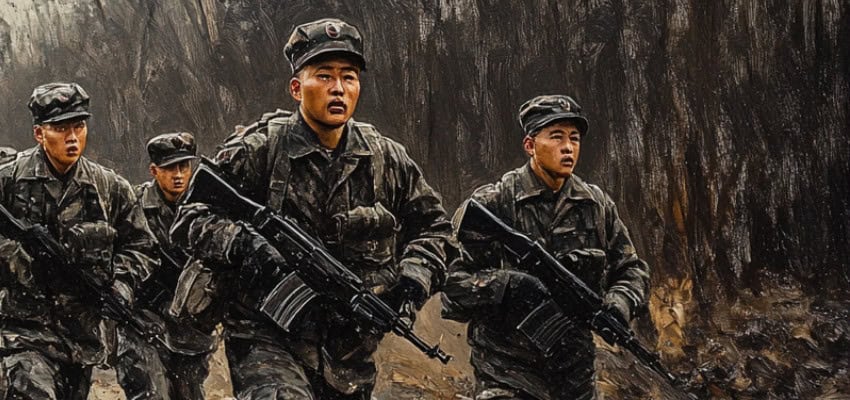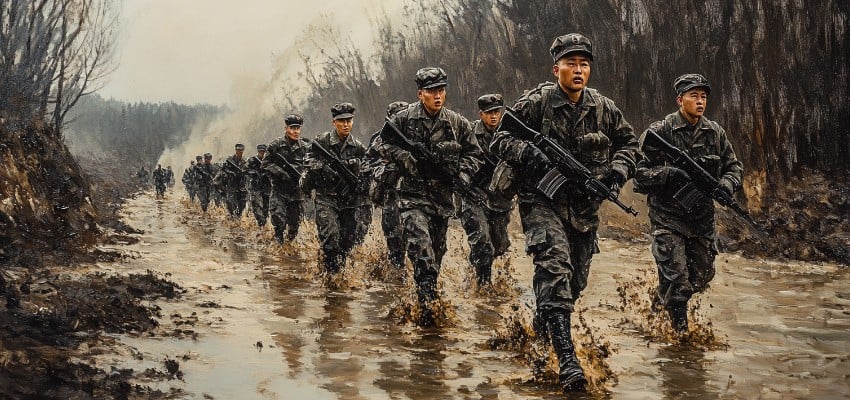Editor’s Note: The deployment of North Korean special forces to Russia signals a significant escalation in the Ukraine conflict, reflecting deepening military ties between two internationally isolated nations. This report examines the strategic and geopolitical implications of North Korea’s involvement, alongside Russia’s intensifying military operations in key regions like Donetsk and Kursk. As both countries face mounting international pressure, this new phase in the conflict could further complicate diplomatic efforts, heighten tensions with Ukraine’s allies, and shape the trajectory of the war in the coming months.
For those seeking to grasp the full scope of this evolving landscape, the complete updates from the Institute for the Study of War serve as an invaluable resource.
Content Assessment: North Korean Forces Deployed to Russia: Escalation in Ukraine Conflict
Information - 93%
Insight - 92%
Relevance - 90%
Objectivity - 94%
Authority - 95%
93%
Excellent
A short percentage-based assessment of the qualitative benefit expressed as a percentage of positive reception of the recent article from ComplexDiscovery OÜ titled, "North Korean Forces Deployed to Russia: Escalation in Ukraine Conflict."
Background Note: ComplexDiscovery’s staff offers distinctive perspectives on the Russo-Ukrainian war and Iran-Israel conflict, informed by military experience on the West German, East German, and Czechoslovakian border during the Cold War and in Sinai as part of Camp David Accord compliance activities. This firsthand regional knowledge has been further enhanced by recent staff travels to Eastern European countries, including Estonia, Latvia, Lithuania, and Poland. These visits have provided up-to-date, on-the-ground insights into the current geopolitical climate in regions directly impacted by the ongoing conflict.
Combined with cybersecurity, information governance, and eDiscovery proficiency, this multifaceted experience enables comprehensive analysis of these conflicts, including the critical impact of cyber warfare, disinformation, and digital forensics on modern military engagements. This unique background positions ComplexDiscovery to provide valuable insights for conflict-related investigations and litigation, where understanding the interplay of technology, data, and geopolitical factors is crucial.
Russo-Ukrainian Conflict Update*
North Korean Forces Deployed to Russia: Escalation in Ukraine Conflict
ComplexDiscovery Staff
On October 18, 2024, South Korea’s National Intelligence Service (NIS) reported a critical development in the ongoing conflict between Russia and Ukraine: North Korea has sent approximately 1,500 special forces to eastern Russia. This move, which signals an escalation in Russia’s war efforts, reflects deepening military cooperation between Russia and North Korea. The North Korean forces, transported via seven ships of the Russian Pacific Fleet, are currently undergoing training in Vladivostok, Ussuriysk, Khabarovsk, and Blagoveshchensk before their expected deployment to the frontlines in Ukraine.
According to the NIS, these forces are the first wave of an anticipated 12,000 North Korean soldiers that Pyongyang has committed to sending. Ukrainian intelligence reports estimate that nearly 11,000 North Korean infantry troops are already in Russia, preparing for combat deployment by November 2024. These troops, disguised in Russian uniforms and equipped with fake identification documents, will likely be stationed in Kursk Oblast and other key areas where Russian forces are under pressure.
This deployment highlights the strategic partnership between Russia and North Korea, both of which face international sanctions and diplomatic isolation. The involvement of North Korean special forces in the Ukraine conflict marks a significant shift, providing Russia with a new source of manpower as it struggles to maintain its offensive operations.
North Korean Troops: Strategic and Tactical Impact
The addition of North Korean forces to Russia’s military efforts introduces new dynamics to the Ukraine conflict. Known for their discipline and resilience, North Korean special forces could provide a tactical advantage to Russia, especially in defensive and siege operations. However, there are concerns about the integration of these forces with Russian troops, given differences in training, language barriers, and command structures.
Reports from Russian and Ukrainian intelligence suggest that North Korean forces will initially be deployed in Kursk Oblast, a region where Russian forces have faced sustained Ukrainian counteroffensives. As of late October, Russian forces in the region have advanced in some areas but remain vulnerable to Ukrainian attacks. The involvement of North Korean troops could bolster Russia’s defensive capabilities, particularly in critical sectors where Russian forces are stretched thin.
Intensified Russian Military Activity in Donetsk and Kursk Oblasts
While North Korean troops prepare for deployment, Russian forces have significantly escalated their operations in key regions, particularly in western Donetsk Oblast and Kursk Oblast. The intensified military activity coincides with the onset of autumn rains, which are creating muddy conditions that hinder infantry movements and favor the use of mechanized forces.
In Donetsk Oblast, Russian forces have launched a series of mechanized assaults aimed at securing strategic positions before the worsening weather makes operations more difficult. On October 18 and 19, Ukrainian forces repelled several of these assaults, particularly near Maksymilyanivka and Selydove. Ukrainian defenders destroyed multiple Russian armored vehicles and tanks in these encounters, highlighting the effectiveness of their defenses against the increasingly mechanized Russian operations.
Russian forces have also intensified operations in Kursk Oblast, where fighting along the salient has been fierce. Russian troops, supported by airborne units and special forces, have advanced in areas such as Lyubimovka and Plekhovo. However, Ukrainian counterattacks have limited Russian gains, and the arrival of North Korean troops in the region could provide Russia with the additional manpower needed to hold and expand these positions.
Ukrainian Counteroffensive and POW Exchanges
Ukraine continues to mount a resilient defense against Russian advances, particularly in Donetsk and Kursk Oblasts. In Donetsk, Ukrainian forces have successfully repelled several large-scale Russian assaults, inflicting heavy losses on Russian armored units. In Kursk, Ukrainian forces are actively counterattacking, preventing Russian troops from achieving a decisive breakthrough.
Amid the intensifying conflict, Ukraine and Russia conducted a one-for-one prisoner of war (POW) exchange on October 18, marking the fourth such exchange since August 2024. Ukrainian President Volodymyr Zelensky announced that 95 Ukrainian servicemembers, including defenders of the Azovstal Steel Plant, were returned to Ukraine. Many of these soldiers had endured severe torture and malnutrition in Russian captivity, underscoring the harsh conditions faced by POWs in this conflict.
The increase in POW exchanges since Ukraine’s Kursk offensive began reflects the pressure Russian forces are facing. Both sides have exchanged 267 POWs in four exchanges since August, a significant increase compared to earlier in the year. The frequent exchanges suggest that the Ukrainian offensive in Kursk is forcing Russia to negotiate more frequently, as it seeks to maintain morale and logistical capabilities.
Geopolitical Ramifications and Russia’s Strategic Calculations
The deployment of North Korean troops to Russia and the intensification of Russian military operations are occurring in a complex geopolitical context. Russian President Vladimir Putin continues to reject meaningful peace negotiations with Ukraine, using international platforms like the BRICS summit to portray Russia as willing to negotiate while simultaneously committing to a protracted military campaign. Putin’s remarks that Russia is “ready to continue this fight” and that “victory will be ours” highlight Moscow’s resolve to pursue military solutions rather than diplomatic ones.
The North Korean deployment also reflects a broader strategy by the Kremlin to offset the manpower shortages caused by the war without resorting to an unpopular mass mobilization. By leveraging its alliance with Pyongyang, Moscow can bring in foreign troops while avoiding further domestic political unrest.
However, the introduction of North Korean forces could provoke strong international responses. North Korea’s involvement in the Ukraine war could lead to increased sanctions and diplomatic isolation, particularly from countries like South Korea, Japan, and the United States. Furthermore, the deployment raises the risk of further escalation, as North Korean troops on Ukrainian soil could be seen as a direct provocation by Ukraine’s allies.
Escalation in Ukraine
The deployment of North Korean special forces to Russia marks a significant escalation in the Ukraine conflict. As Russian forces intensify their mechanized assaults in Donetsk and Kursk, the presence of North Korean troops could bolster Russia’s ability to sustain its offensive operations. However, the full impact of this deployment remains to be seen, particularly as winter approaches and ground conditions deteriorate.
Ukraine continues to mount a strong defense, repelling multiple Russian assaults and advancing its counteroffensives. The frequent POW exchanges suggest that Ukrainian forces are placing significant pressure on Russian troops, particularly in Kursk. As the conflict enters a more complex and potentially more dangerous phase, the involvement of North Korean forces adds another layer of uncertainty to the war’s trajectory.
News Sources
As a leading source for cybersecurity, information governance, and legal discovery insights, including international investigations and litigation, ComplexDiscovery OÜ recognizes the importance of awareness regarding alleged and documented criminal acts, particularly in the context of the Russia-Ukraine conflict. While we, following the lead of the Institute for the Study of War (ISW), do not provide detailed coverage of war crimes in our primary reports, we encourage professionals within the eDiscovery ecosystem to stay informed about these activities. This awareness is crucial for understanding potential future legal actions and responsibilities.
Detailed Reporting with Maps for October 18-19, 2024, from the ISW – Mouseover to Scroll
Ukraine Control Of Terrain - October 18-19 2024Review the Detailed Reporting and Maps PDF
About the Institute for the Study of War Research Methodology
ISW’s research methodology relies on both primary and secondary sources, enabling researchers to develop a comprehensive understanding of the situation on the ground. In order to analyze military and political developments in any given area, ISW’s research analysts must wholly understand the systems of enemy and friendly forces. They must also understand the population demographics, physical terrain, politics, and history of that area. This lays the analytical foundation for understanding the reasons for particular developments and fulfilling their assigned research objectives. ISW analysts also spend time in places like Iraq, Afghanistan, and elsewhere in order to gain a better understanding of the security and political situation and to evaluate the implementation of current strategies and policies. Our researchers compile data and analyze trends, producing a granular analysis of developments in areas of research, producing an accurate, high-resolution, timely, and thorough picture of the situation. ISW’s research methodology guarantees its success and commitment to improving the nation’s ability to execute military operations, achieve strategic objectives, and respond to emerging problems that may require the use of American military power.
About the Institute for the Study of War
The Institute for the Study of War advances an informed understanding of military affairs through reliable research, trusted analysis, and innovative education. They are committed to improving the nation’s ability to execute military operations and respond to emerging threats in order to achieve U.S. strategic objectives. ISW is a non-partisan, non-profit, public policy research organization.
Learn more, get involved, and contribute today.
Additional Reading
- From Dissent to OSINT? Understanding, Influencing, and Protecting Roles, Reputation, and Revenue
- [Annual Update] International Cyber Law in Practice: Interactive Toolkit
- Data Embassies: Sovereignty, Security, and Continuity for Nation-States
Assisted by GAI and LLM Technologies
* Sourced and shared with direct express permission from the Institute for the Study of War (ISW).
Source: ComplexDiscovery OÜ



























